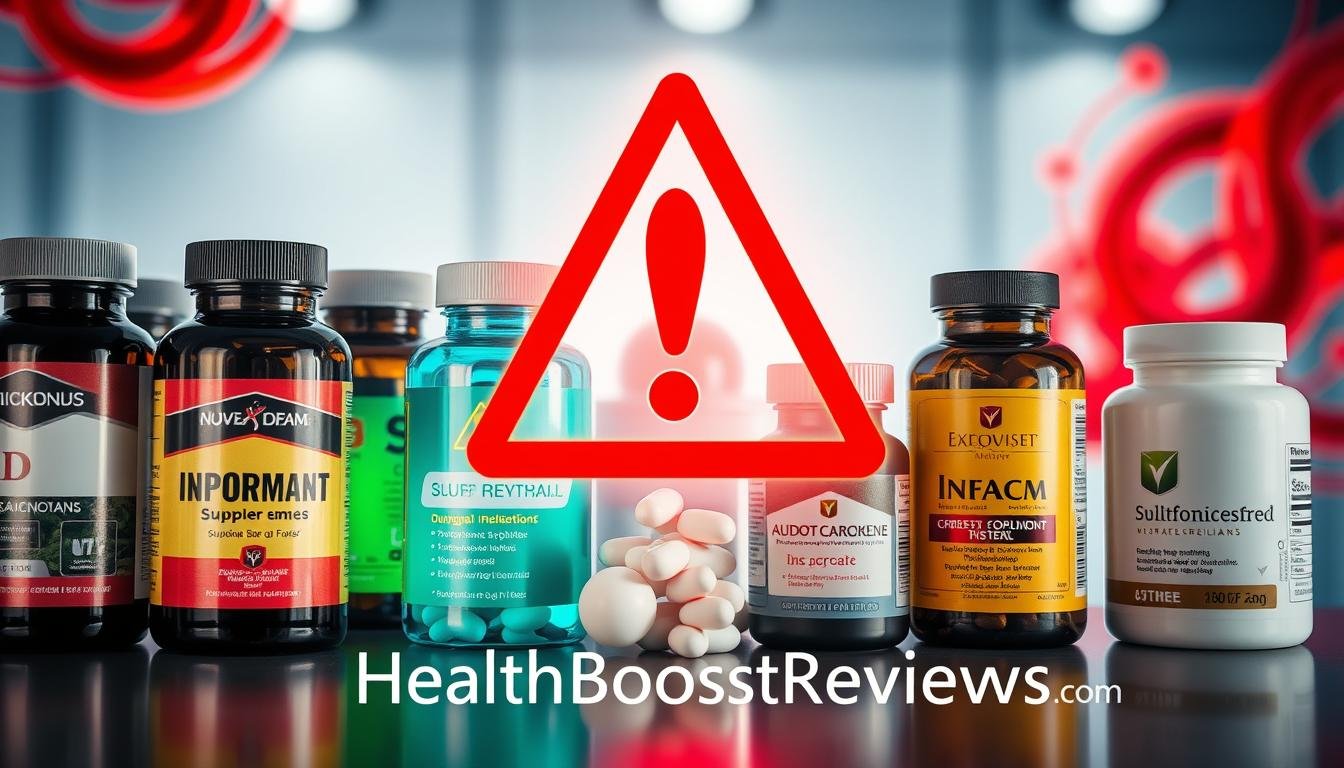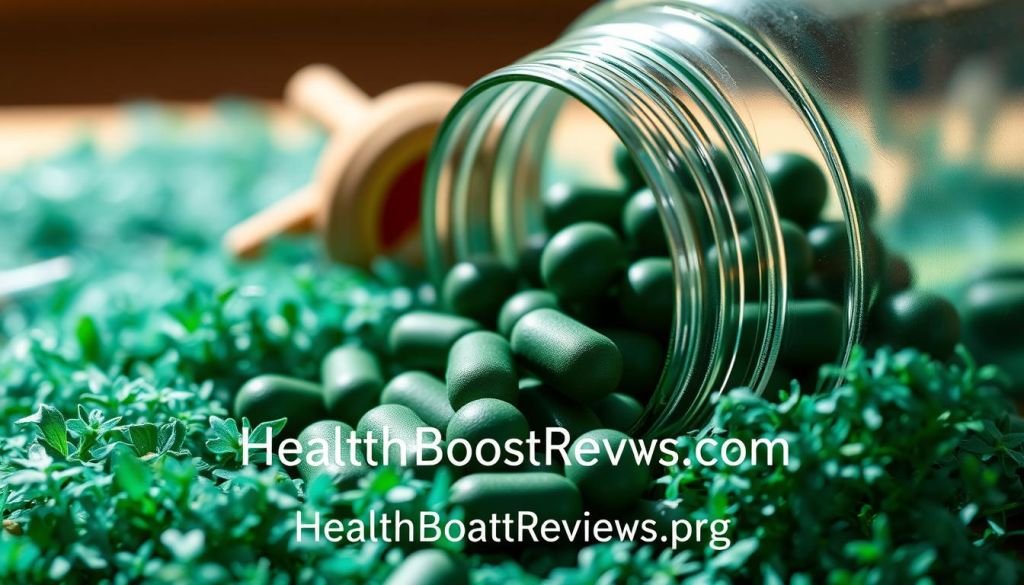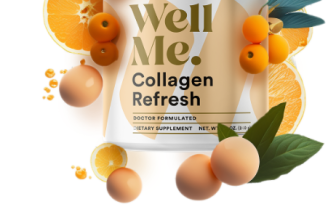
Chronic inflammation can harm your health a lot. It might lead to serious problems like heart disease and autoimmune disorders. Many people use supplements to fight inflammation, but not all are safe.
Experts say some supplements can make inflammation worse. This can hurt your health more than help it. It’s important to know which supplements are safe for you.
Some natural remedies might not be good for you. They could make your immune system react badly or even damage organs. It’s key to think carefully about your diet to avoid health risks.
Doctors suggest avoiding certain supplements that can cause inflammation. Knowing which ones to avoid can help keep your body safe. It’s important for managing your health well.
Key Takeaways
- Some supplements can intensify inflammation instead of reducing it
- Certain natural remedies may cause unexpected health complications
- Consulting healthcare professionals is critical before starting any supplement regimen
- Inflammation management requires a complete approach beyond supplements
- Individual health conditions significantly impact supplement safety
Understanding Inflammation and Supplement Risks
Exploring anti-inflammatory supplements can be tough. Over half of Americans use herbal or dietary supplements every day. But, not all supplements are safe for fighting inflammation.
Inflammation is a natural defense in your body. But, it can turn into a serious health problem if it lasts too long. Knowing the difference between short-term and long-term inflammation is key to choosing safe supplements.

Acute vs. Chronic Inflammation: What You Need to Know
- Acute inflammation: Short-term response to injury or infection
- Chronic inflammation: Prolonged immune system response
- Potential long-term health risks associated with chronic inflammation
Why Some Supplements Can Worsen Inflammation
Nutritionists warn about the dangers of some supplements. The global dietary supplements market was worth $151.9 billion in 2021. Yet, many products can cause inflammation.
| Supplement Type | Potential Inflammatory Risk |
|---|---|
| Herbal Supplements | Unregulated by FDA, possible organ damage |
| High-Dose Calcium | May increase heart disease risk |
| St. John’s Wort | Can cause dangerous drug interactions |
The Importance of Expert Guidance
Always talk to healthcare experts before taking supplements. Your health history, current conditions, and medications are important for safe supplement use.
“Not all supplements heal – some can harm. Always seek professional medical advice before starting any new supplement regimen.”
Oral Arnica: Hidden Dangers for Inflammatory Conditions
Arnica supplements are popular for fighting inflammation. But, not all forms are safe inside the body. Topical use can help, but taking it orally is risky.
Arnica has been used for centuries. It’s known for its anti-inflammatory properties. Yet, experts advise against taking it by mouth.
Topical vs. Oral Usage Differences
It’s important to know the difference between using arnica on the skin and taking it orally:
- Topical arnica is safe for the skin
- Oral arnica can be dangerous
- Use creams and ointments for muscle pain and bruises
Potential Side Effects and Risks
Oral arnica supplements can cause serious health problems:
| Side Effect | Potential Impact |
|---|---|
| Heart Damage | Serious cardiovascular risks |
| Increased Bleeding | Potential hemorrhage risks |
| Vomiting | Digestive system disruption |
Expert Recommendations on Arnica Use
“Arnica should only be used topically, with extreme caution for those managing inflammatory conditions,” recommends leading herbal medicine experts.
If you’re looking for natural ways to manage inflammation, talk to a healthcare professional. They can help find safe alternatives to oral arnica supplements.
Chaparral: A Banned Supplement with Serious Health Implications
The chaparral supplement comes from the creosote bush. It might seem like a natural health fix. But, this banned supplement has big health risks that don’t match any benefits. Experts say using chaparral can harm your liver a lot.
“Chaparral is not a safe supplement and can cause serious liver toxicity,” warns leading hepatology researchers.
Studies have found some scary facts about chaparral supplements:
- Documented cases of toxic hepatitis in California and Texas
- Potential for severe liver and kidney damage
- Banned in multiple countries due to health risks
- Increased risk for individuals taking certain medications
A study of 18 cases showed chaparral can damage your liver for good. The main compound, nordihydroguaiaretic acid (NDGA), can cause serious health problems.
| Health Risk | Potential Consequences |
|---|---|
| Liver Damage | Toxic hepatitis, possible liver failure |
| Kidney Impact | Potential renal cell complications |
| Medication Interactions | Increased risk for patients on specific treatments |
Even though some studies suggest chaparral might fight cancer, the FDA and Health Canada say no to it. Your health is the most important thing. Always talk to a doctor before trying any new supplement.
Warning: The risks associated with chaparral supplements far outweigh any possible benefits.
Cat’s Claw and Its Impact on Autoimmune Conditions
The cat’s claw supplement comes from the Amazon rainforest. It’s known for its health benefits. But, people with autoimmune conditions need to be very careful.
Cat’s claw has strong compounds that can change how your immune system works. Studies show it can interact with medicines and pose risks for some groups. So, it’s important to think carefully before using it.
Medication Interactions to Consider
Using a cat’s claw supplement means knowing about possible interactions with medicines:
- Blood thinners like warfarin
- Immunosuppressant drugs
- Blood pressure medications
- Diuretics
It’s very important to talk to a healthcare professional before starting any new supplement.
Risk Factors for Specific Populations
Some groups should not use cat’s claw because of health risks:
- People with autoimmune conditions
- Individuals with kidney or liver disease
- Pregnant or nursing women
- Patients with tuberculosis
- Those with recent organ transplants
“Always prioritize your health by seeking professional medical advice before introducing new supplements,” recommends leading immunology experts.
Some studies suggest cat’s claw might help with osteoarthritis and inflammation. But, the risks for those with autoimmune conditions are often too high. It could make their symptoms worse because it boosts the immune system.
5 Supplements You Shouldn’t Be Taking If You Have Inflammation, According to Dietitians
Choosing the right anti-inflammatory supplements can be hard. Dietitians warn about the dangers of some supplements, mainly for those with inflammatory conditions. Not every supplement is safe, and some might even make inflammation worse.
Experts say there are several supplements that could be harmful for people with inflammation:
- Oral Arnica: Potentially dangerous when ingested
- Chaparral: Linked to serious liver complications
- Cat’s Claw: May overstimulate the immune system
- Spirulina: Can trigger unexpected immune responses
- Kava: Associated with significant liver function risks
“Understanding supplement risks is key to managing inflammation well” – Registered Dietitian Nutritionist
Before taking anti-inflammatory supplements, it’s important to talk to a healthcare professional. Each supplement has its own risks that could make inflammation worse.
| Supplement | Primary Risk | Recommended Action |
|---|---|---|
| Oral Arnica | Toxic when ingested | Avoid oral consumption |
| Chaparral | Liver damage | Complete elimination |
| Cat’s Claw | Immune system overactivation | Medical consultation |
Remember, how you react to supplements can differ. What helps one person might harm another.
Spirulina: When Blue-Green Algae Becomes Problematic

Spirulina supplements from blue-green algae might look like a nutritional dream. But, they can be risky for some people. They have a lot of protein, about 60% by weight. Yet, they’re not good for everyone’s immune system.
Potential risks with spirulina supplements include:
- Severe autoimmune responses affecting skin and muscles
- Potential liver contamination from microcystins
- Anticoagulant effects that impact blood clotting
- Allergic reactions that can be potentially fatal
Some groups should be very careful with spirulina. People with autoimmune conditions, allergies, or specific metabolic disorders like phenylketonuria (PKU) face increased risks. The National Institute of Health advises talking to a healthcare professional before adding spirulina to your diet.
“Not all supplements are beneficial for everyone. Spirulina can overstimulate the immune system, potentially worsening symptoms in people with autoimmune diseases.” – Nutrition Expert
In the United States, dietary supplement rules are not strict. This means even approved spirulina products might have hidden risks. Experts say to only take up to 8 grams a day. Be aware of side effects like nausea, insomnia, and headaches.
If you’re thinking about taking spirulina supplements, get advice from a doctor. They can give you advice based on your health.
Kava’s Effects on Liver Function and Inflammation
Kava supplements are getting more attention for their health benefits. But, they can be risky, mainly for your liver. These herbs were once used to relax, but they can actually harm your health.
It’s important to know the dangers of kava supplements. Research shows a big problem with kava and liver health.
Liver Health Concerns with Kava
Kava supplements have big risks. Here are some key points:
- Over 100 cases of liver toxicity have been documented
- Some cases required liver transplants or resulted in fatal outcomes
- Liver enzyme levels can become significantly elevated with regular use
“Kava supplements may offer short-term relief, but the liver damage is much worse.” – Medical Research Review
Why Liver Function Matters for Inflammation
Your liver is key in fighting inflammation. If it’s not working right, your body can’t handle inflammation well.
| Kava Use Factor | Potential Health Impact |
|---|---|
| Short-term Use | Possible mild liver enzyme elevation |
| Long-term Use | Significant risk of liver damage |
| High Dosage | Increased likelihood of liver toxicity |
Genetics also affect how you process kava. Only 79-88% of Caucasians have the necessary enzyme to process kava safely, compared to 99% of Pacific Islanders.
If you’re thinking about using kava for inflammation, talk to a doctor first. The risks to your liver make kava supplements a bad choice for most people.
Natural Alternatives for Managing Inflammation
Inflammation is a silent threat to your health. It can lead to serious diseases like diabetes, heart disease, and cancer. Instead of using risky supplements, try natural remedies and lifestyle changes.

An anti-inflammatory diet is a good start. Experts say to eat whole, nutrient-rich foods. These foods help reduce inflammation in your body.
Diet-Based Solutions for Reducing Inflammation
The right food can help manage inflammation. Here are some dietary tips:
- Eat foods rich in omega-3s like fatty fish
- Include colorful fruits and vegetables
- Choose whole grains over refined carbs
- Use spices like turmeric and ginger
Lifestyle Modifications to Combat Inflammation
There are natural ways to fight inflammation beyond diet. Your daily habits are important too.
| Lifestyle Factor | Inflammation Impact |
|---|---|
| Regular Exercise | Reduces inflammatory markers |
| Quality Sleep | Helps reset inflammatory processes |
| Stress Management | Lowers cortisol and inflammatory responses |
Safe Anti-Inflammatory Practices
Using a holistic approach can greatly improve your body’s response to inflammation. Consistent, sustainable changes are key to long-term health.
“Prevention is always better than cure” – This is true for managing inflammation
By adopting these natural strategies, you can lower inflammation and boost your health. You won’t need harmful supplements.
Conclusion
Managing inflammation needs careful thought about supplement safety. Studies show over 70% of Americans take dietary supplements every day. But not all supplements help with inflammation. It’s important to get expert advice and understand the risks.
Supplement safety is key for chronic inflammation. Many think herbal products are safe, but they can have serious health effects. Up to 45% of patients use herbal supplements with medicines, not realizing they could make inflammation worse.
Getting advice from healthcare professionals is essential before trying new supplements. Some supplements, like arnica, chaparral, and kava, can make inflammation worse or cause serious health problems. The best approach includes a healthy diet, exercise, stress reduction, and medical guidance tailored to you.
Choosing the right supplements is critical for your health. The supplement industry makes over $28 billion a year, and marketing can be tricky. Stick to proven solutions and listen to your doctor to keep your health in check and manage inflammation well.






